Guam (1944) order of battle
On 21 July 1944, United States Marine and Army forces landed on the west coast of the island of Guam, the southernmost of the Mariana Islands. The island, a U.S. territory prior to World War II, had been captured by forces of the Empire of Japan 8–10 December 1941.
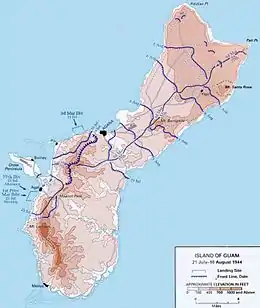
The invasion of Guam was part of Operation Forager, an effort to recapture the entire Marianas chain from Japan. The Guam landings had been tentatively set for 18 June but a large Japanese carrier attack and stubborn resistance by the unexpectedly large Japanese garrison on Saipan led to the invasion of Guam being postponed for a month.
The island was declared secure on 10 August 1944.
United States
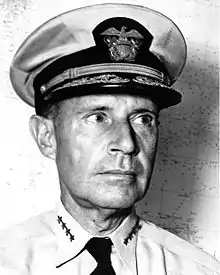

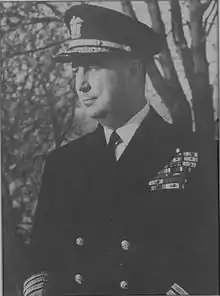

Naval forces
U.S. Fifth Fleet[1]
Admiral Raymond A. Spruance in heavy cruiser Indianapolis
Joint Expeditionary Force (Task Force 51)
Vice Admiral Richmond Kelly Turner in amphibious command ship Rocky Mount
- Northern Attack Force (Task Force 52 – Saipan and Tinian)
- Vice Admiral Turner
- Southern Attack Force (Task Force 53 – Guam)
- Vice Admiral Richard L. Conolly in amphibious command ship Appalachian
Ground forces
Expeditionary Troops (Task Force 56)
- Commanding General: Lt. Gen. Holland M. "Howlin' Mad" Smith[lower-alpha 1]
- Chief of Staff: Brig. Gen. Graves B. Erskine[lower-alpha 2]
- Personnel Officer (G-1): Lt. Col. Albert F. Metze
- Intelligence Officer (G-2): Col. St. Julien R. Marshall
- Operations Officer (G-3): Col. John C. McQueen
- Logistics Officer (G-4): Col. Raymond E. Knapp
- Plans Officer (G-5): Col. Joseph T. Smith
- Northern Troops and Landing Force (Task Group 56.1 – Tinian and Saipan)
- Consisting of V Amphibious Corps
- Southern Troops and Landing Force (Task Group 56.2 – Guam)
- Consisting of III Amphibious Corps
- Chief of Staff: Brig. Gen. Graves B. Erskine[lower-alpha 2]
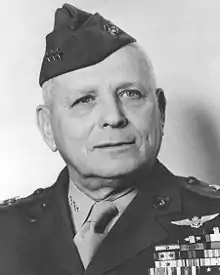
- Commanding General: Maj. Gen. Roy S. Geiger[lower-alpha 3]
- Chief of Staff: Brig. Gen. Merwin H. Silverthorn
- Personnel Officer (C-1): Col. William J. Scheyer
- Intelligence Officer (C-2): Lt. Col. William F. Coleman
- Operations Officer (C-3): Col. Walter A. Wachtler
- Logistics Officer (C-4): Lt. Col. Frederick L. Wieseman
- Chief of Staff: Brig. Gen. Merwin H. Silverthorn
- Northern landing area (West of Agana):
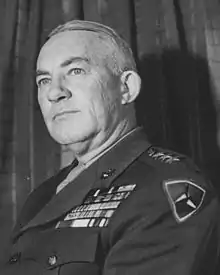
![]()
- Commanding General: Maj. Gen. Allen H. Turnage[lower-alpha 4]
- Assistant Commander: Brig. Gen. Alfred H. Noble
- Chief of Staff: Col. Ray A. Robinson
- Personnel Officer (D-1): Lt. Col. Chevey S. White (KIA 22 July); Maj Irving R. Kriendler (from 22 July)
- Intelligence Officer (D-2): Lt. Col. Howard J. Turton (to 28 July); Lt. Col. Ellsworth N. Murray (from 29 July)
- Operations Officer (D-3): Col. James A. Stuart (to 28 July); Lt. Col. Howard J. Turton (from 29 July)
- Logistics Officer (D-4): Lt. Col. Ellsworth N. Murray (to 28 July); Col. William C. Hall (from 29 July)
- Left Sector (Red Beaches):
- 3rd Marine Regiment
- Commanding Officer: Col. William C. Hall (to 28 July); Col. James A. Stuart (from 29 July)
- Executive Officer: Col. James D. Snedeker
- 1st Battalion, 3rd Marines
- Commanding Officer: Maj. Henry Aplington, II
- Executive Officer: Maj. John A. Ptak (KIA 1 August)
- 2nd Battalion, 3rd Marines
- Commanding Officer: Lt. Col. Hector de Zayas (KIA 26 July); Maj. William A. Culpepper (from 26 July)
- Executive Officer: Maj. William A. Culpepper (to 26 July); Maj. Howard J. Smith (from 26 July)
- 3rd Battalion, 3rd Marines
- Commanding Officer: Lt. Col. Ralph L. Houser (WIA 22 July); Maj. Royal R. Bastian (from 24 July)
- Executive Officer: Maj. Royal R. Bastian (to 23 July); Capt. William R. Bradley (from 24 July)
- 1st Battalion, 3rd Marines
- 3rd Marine Regiment
- Center Sector (Green Beach):
- 21st Marine Regiment
- Commanding Officer: Col. Arthur H. Butler
- Executive Officer: Lt. Col. Ernest W. Fry, Jr.
- 1st Battalion, 21st Marines
- Commanding Officer: Lt. Col. Marlowe C. Williams
- Executive Officer: Lt. Col. Ronald R. Van Stockum
- 2nd Battalion, 21st Marines
- Commanding Officer: Lt. Col. Eustace R. Smoak
- Executive Officer: Maj. Lowell E. English
- 3rd Battalion, 21st Marines
- Commanding Officer: Lt. Col. Wendell H. Duplantis
- Executive Officer: Maj. Edward A. Clark
- 1st Battalion, 21st Marines
- 21st Marine Regiment
- Right Sector (Blue Beaches):
- 9th Marine Regiment
- Commanding Officer: Col. Edward A. Craig
- Executive Officer: Lt. Col. Jaime Sabater (WIA 21 July); Lt. Col. Ralph M. King (from 30 July)
- 1st Battalion, 9th Marines
- Commanding Officer: Lt. Col. Carey A. Randall
- Executive Officer: Maj. Harold C. Boehm
- 2nd Battalion, 9th Marines
- Commanding Officer: Lt. Col. Robert E. Cushman, Jr.
- Executive Officer: Maj. William T. Glass
- 3rd Battalion, 9th Marines
- Commanding Officer: Lt. Col. Walter Asmuth, Jr. (WIA 21 July); Maj. Donald B. Hubbard (WIA 1 August); Maj. Jess P. Ferrill, Jr. (from 1 August)
- Executive Officer: Maj. Donald B. Hubbard (to 22 July); Capt. Calvin W. Kunz, Jr. (from 22 July)
- 1st Battalion, 9th Marines
- 9th Marine Regiment
- Landed after W-Day:
- 12th Marine Regiment (Artillery)
- Commanding Officer: Col. John B. Wilson
- Executive Officer: Lt. Col. John S. Letcher
- 1st Battalion, 12th Marines
- Commanding Officer: Lt. Col. Raymond F. Crist Jr. (WIA 22 July)
- Executive Officer: Maj. George B. Thomas
- 2nd Battalion, 12th Marines
- Commanding Officer: Lt. Col. Donald M. Weller
- Executive Officer: Maj. Henry E. W. Barnes
- 3rd Battalion, 12th Marines
- Commanding Officer: Lt. Col. Alpha L. Bowser
- Executive Officer: Maj. Claude S. Sanders, Jr.
- 4th Battalion, 12th Marines
- Commanding Officer: Lt. Col. Bernard H. Kirk (WIA 21 July)
- Executive Officer: Maj. Thomas R. Belzer
- 1st Battalion, 12th Marines
- 19th Marine Regiment (Engineer)
- Commanding Officer: Lt. Col. Robert E. Fojt
- Executive Officer: Lt. Col. Edmund M. Williams
- 3rd Service Battalion
- Commanding Officer: Lt. Col. Durant S. Buchanan
- 3rd Tank Battalion
- Commanding Officer: Lt. Col. Hartnoll J. Withers
- 12th Marine Regiment (Artillery)
- Southern landing area (South of Orote Peninsula):
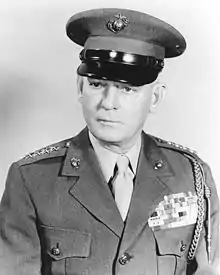
![]()
- Commanding General: Brig. Gen. Lemuel C. Shepherd Jr.[lower-alpha 5]
- Chief of Staff: Col. John T. Walker
- Personnel Officer (B-1): Maj. Addison B. Overstreet
- Intelligence Officer (B-2): Maj. Robert W. Shaw
- Operations Officer (B-3): Lt. Col. Thomas A. Culhane, Jr.
- Logistics Officer (B-4): Lt. Col. August Larson
- Chief of Staff: Col. John T. Walker
- Left Sector (Yellow Beaches):
- 22nd Marine Regiment
- Commanding Officer: Col. Merlin F. Schneider
- Executive Officer: Lt. Col. William J. Wise
- 1st Battalion, 22nd Marines
- Commanding Officer: Lt. Col. Walfried H. Fromhold (to 31 July); Maj. Crawford B. Lawton (from 1 August)
- Executive Officer: Maj. Crawford B. Lawton (to 1 August); Maj. William E. Sperling, III (from 5 August)
- 2nd Battalion, 22nd Marines
- Commanding Officer: Lt. Col. Donn C. Hart (to 27 July); Maj. John F. Schoettel (WIA 27 July)
- Executive Officer: Maj. Robert P. Felker
- 3rd Battalion, 22nd Marines
- Commanding Officer: Lt. Col. Clair W. Shisler (WIA 27 July)
- Executive Officer: Maj. Earl J. Cook
- 1st Battalion, 22nd Marines
- 22nd Marine Regiment
- Right Sector (White Beaches):
- 4th Marine Regiment
- Commanding Officer: Lt. Col. Alan Shapley
- Executive Officer: Lt. Col. Samuel D. Puller (KIA 27 July); Capt. Charles T. Lamb (from 27 July)
- 1st Battalion, 4th Marines
- Commanding Officer: Maj. Bernard W. Green
- Executive Officer: Maj. Robert S. Wade (temp. atchd.)
- 2nd Battalion, 4th Marines
- Commanding Officer: Maj. John S. Messer
- Executive Officer: Maj. Roy S. Batterton, Jr. (WIA 21 July); Capt. Lincoln N. Holdzcom (from 21 July)
- 3rd Battalion, 4th Marines
- Commanding Officer: Maj. Hamilton M. Hoyler
- Executive Officer: Maj. Hugh J. Chapman
- 1st Battalion, 4th Marines
- UDT 3 and UDT 4
- 4th Marine Regiment
- Floating reserve:
- 305th Regimental Combat Team (Army) (detached from 77th Inf. Div.)
- Commanding Officer: Col. V.J. Tanzola, USA
- 305th Regimental Combat Team (Army) (detached from 77th Inf. Div.)
- Reserve:
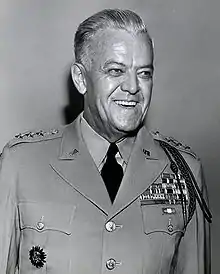
![]()
- Commanding General: Maj. Gen. Andrew D. Bruce, USA[lower-alpha 7]
- Assistant Commanding General: Brig. Gen. Edwin H. Randle, USA
- Commanding General, Divisional Artillery: Brig. Gen. Isaac Spalding, USA
- Chief of Staff: Col. Douglas C. McNair (KIA 6 August);[lower-alpha 8] Lt. Col. Guy V. Miller (from 6 August)
- 306th Regimental Combat Team
- 307th Regimental Combat Team
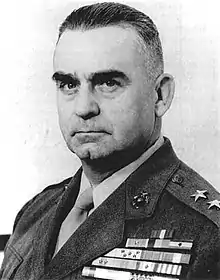
- Subordinate units:
- III Marine Amphibious Corps Artillery
- Commanding General: Brig. Gen. Pedro del Valle[lower-alpha 9]
- Chief of Staff : Col. John A. Bemis
- Personnel Officer (A-1): Maj. James A. Tatsch
- Intelligence Officer (A-2): Warrant Officer David G. Garnett
- Operations Officer (A-3): Lt. Col. Frederick P. Henderson
- Logistics Officer (A-4): Maj. Frederick W. Miller
- 1st 155mm Howitzer Battalion
- Commanding Officer: Col. James J. Keating
- Executive Officer: Maj. George H. Ford
- Operations Officer (Bn-3): Maj. Marshall J. Hooper
- 2nd 155mm Howitzer Battalion
- Commanding Officer: Lt. Col. Marvin H. Floom
- Executive Officer: Maj. Gene N. Schraeder
- Operations Officer (Bn-3): Maj. Earl J. Fowse
- Chief of Staff : Col. John A. Bemis
- Commanding General: Brig. Gen. Pedro del Valle[lower-alpha 9]
- 9th Defense Battalion
- Commanding Officer: Lt. Col. Archie E. O'Neil
- 14th Defense Battalion
- Commanding Officer: Lt. Col. William F. Parks
Guam Island Command
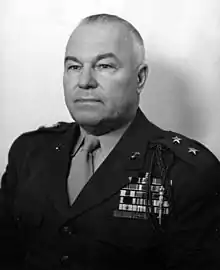
- Commanding General: Maj. Gen. Henry L. Larsen[lower-alpha 10]
- Chief of Staff: Col. Robert Blake
- Personnel Officer (A-1): Col. Lee N. Utz
- Intelligence Officer (A-2): Col. Francis H. Brink
- Operations Officer (A-3): Col. Benjamin W. Atkinson (to 8 August); Lt. Col. Shelton C. Zern (from 9 August)
- Logistics Officer (A-4): Col. James A. Mixson
- Plans Officer (A-5): Col. Charles I. Murray
- 1st Provisional Base Headquarters Battalion
- Commanding Officer: Lt. Col. Victor A. Barraco
- Headquarters Company: 1st Lt. Emerson S. Clark, Jr.
- Military Police Company: Capt. Paul J. Swartz
- 5th Field Depot
- Commanding Officer: Lt. Col. Walter A. Churchill
- Executive Officer: Lt. Col. Patrick J. Haltigan, Jr.
- Operations Officer: Maj. John W. Allen
- Chief of Staff: Col. Robert Blake
Japan
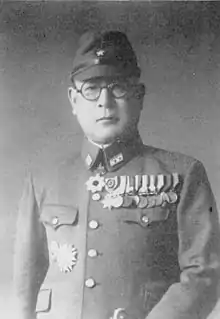

Overall command:[4]
- Lt. Gen. Takeshi Takashina (KIA 28 July)
Thirty-First Army:[lower-alpha 11]
- Lt. Gen. Hideyoshi Obata (seppuku 11 August)
- Approx. 19,000 officers and enlisted
- 29th Division (Lt. Gen. Takashina)
- 18th Infantry Regiment
- 38th Infantry Regiment
- 1st Tank Division
- 9th Tank Regiment
- 48th Independent Brigade
- 10th Independent Mixed Regiment
- 6th Expeditionary Force: Maj. Gen. Kiyoshi Shigematsu (KIA 26 July)
- 319th, 321st, 322nd, 820th Independent Infantry Battalions
- 29th Division (Lt. Gen. Takashina)
Navy Land Units
Navy Air Service
Additional air defense, engineer, signals, etc., support elements
Notes
- Generated so much ill will between the armed services in the Pacific Theater that he had to be relieved of command in July 1945.[2]
- Commanded 3rd Marine Division on Iwo Jima.
- Commanded III Amphibious Corps on Okinawa and assumed command of US Tenth Army upon the death of Lt. Gen. Buckner.
- Served as Assistant Commandant of the Marine Corps after the war.
- Served as Commandant of the Marine Corps from 1952 through 1955.
- Less 305th RCT which was attached to the 1st Provisional Marine Brigade for this operation.[3]
- Commanded 77th Division again during the capture of the island of Ie Shima during the Okinawa campaign.
- Son of Lt. Gen. Leslie J. McNair who had been killed by errant Allied bombs in France 12 days earlier.
- Commanded 1st Marine Division on Okinawa.
- Served as Governor of Guam after the war.
- A Japanese army was equivalent to a Euro-American corps.
References
- Rottman, p. 35
- Rottman, p. 31
- Rottman, p. 90
- Rottman, p. 90
Bibliography
- Morison, Samuel Eliot (1953). New Guinea and the Marianas, March 1944 – August 1944. History of United States Naval Operations in World War II. VIII. Boston: Little, Brown and Co. LCCN 53-7298.
- Rottman, Gordon L. (2004). Guam 1941 & 1944: Loss and reconquest. Oxford: Osprey Publishing Ltd. ISBN 978-1-84176-811-3.
